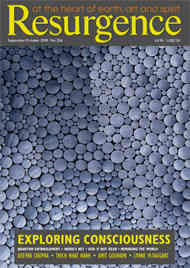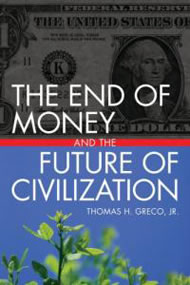What makes Thomas Greco’s work outstanding is the combination of breadth of analysis, clarity of expression, historical narrative and practical example that he brings to bear. This book proposes “solutions that are entrepreneurial and innovative, based on bottom-up organisation and voluntary association”.
It describes the organic nature of social process and the further evolution of human society as a consciously undertaken choice born of the need to recreate social forms out of core ideas and values. Greco pays heed to the principle of metamorphosis not as an inevitable concomitant of human evolution but as a conscious aim: “the caterpillar’s metamorphosis into the butterfly might offer us an apt analogy for our changing civilisation… The structures we need to create must be consistent with the values we espouse and the outcomes we wish to produce. These both determine and are determined by who we are, how we behave, and how we interact.”
Greco disassociates himself from “coercion or the forced redistribution of wealth” and warns against a politically enacted monetary reform agenda, preferring instead “to reconceive, in the most fundamental sense, the very ideas of bank, money, and credit card [and shift] efforts from the political arena to participate in the design revolution”.
The separation of money and state is seen by Greco as an aspect of humanity’s evolution towards true democracy, and he cites the now widely accepted separation of church and state as an analogous principle. Greco wants to liberate “the exchange process from the dominance of political and banking interests”, for it is this unholy alliance that holds together the status quo.
There is an urgent need to understand that money is not a kind of ‘thing’ (whether tangible or intangible): “banks perpetuate the myth that money is a ‘thing’ to be lent.” For Greco there are two basic questions that need to be addressed, one relating to the exchange function, and the other relating to the finance function. Both of these involve the use of credit. The exchange function has need of short-term credit that bridges the gap between the delivery of goods to market and the sale of those goods. It is this credit, and only this credit, that should be embodied in modern money as a virtual representation of real value in the form of goods and services.
The solution for the finance function would seem to lie mainly in making a shift from debt financing to temporary equity financing: “equity (being shared ownership) tends to harmonise the interests of the user of capital with those of the provider of capital in that both the rewards and the risks are shared.”
Greco sees the functions of money as contradictory: “If money is a medium of exchange, it needs to be spent, but if it is a store of value, it should be held.” He explores the nature or measure of value and its problematic identification with currency and contends that “we need to segregate these functions in order to optimise and restore honest dealing to the reciprocal exchange process.” An unequivocal finger is pointed at legal tender laws in falsifying economic values.
The apocalyptic nature of Greco’s title signals the seriousness of what he intends to convey. The book ends with an exhortation to reverse “destructive and despotic trends, and prevent our sliding into a modern form of materialistic feudalism.”
A full review is available at www.anthromedia.com/articles/economics/perspectives/








